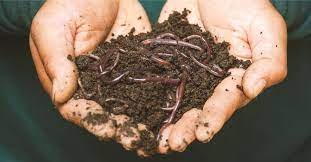Vermicomposting good for the environment and gains for people
Vermicomposting, also called vermicomposting, refers to the transformation of organic waste by earthworms. It is a natural, odorless aerobic process that is very different from conventional composting. Earthworms ingest organic waste and then excrete dark, odorless, fertile manure and organic-rich mud pellets that make an excellent soil amendment. Worm manure is a ready-to-use fertilizer that can be applied in larger quantities than compost, since its nutrients are released at a rate that suits growing plants.
Vermicomposting can be done on a small scale with household organic waste, or on a large scale, either on the farm with manure or in the food industry with organic waste, for example fruit and vegetables. When the system is well designed, vermicomposting represents a waste treatment method:
clean and socially acceptable, which produces little or no odor;
which requires no energy input for aeration;
which reduces the mass of waste by 30%;
which yields a valuable worm manure by-product;
which even produces worms that can be used as bait for fishing.
Important facts about vermicomposting
It takes 22 to 32 days to turn organic waste into manure, depending on its density and the maturity of the earthworms (it takes 30 to 40 days for regular compost, followed by 3 to 4 months of drying).
Worm manure does not require drying, but it undergoes a two-week nitrification process during which the ammonium is converted into nitrates, a form in which plants can assimilate it.
It is necessary to use organic matter that appeals to worms, and in particular that has a density of 350 to 650 g/L.
Too high densities of worms should be avoided; ideally there should be 150 per liter of waste.
Earthworms ingest about 75% of their body weight daily, or 0.15 g of matter for a 0.2 g individual.
If you notice worms trying to escape from a system, they probably don't like the food or the environment.
Earthworms take about a week to migrate from finished manure (earth casting) to fresh waste.
This is the area where the most interesting and convincing results have been obtained.
Many researchers have found that vermicompost still stimulates plant growth even though they are already receiving optimal nutrition.
Atiyeh et al. (2002) conducted an extensive review of the literature on this phenomenon. They point out that “these studies have repeatedly proven that vermicomposted organic waste has beneficial effects on plant growth independent of nutritional transformations and availability. Whether used as amendments or entering soilless horticulture media, vermicomposts have repeatedly improved germination, seedling growth and development, and increased plant productivity far more than it would not be possible with the simple transformation of nutritional mineral substances in order to make them more available. »
In addition, the authors report a discovery already reported by others (Arancon, 2004): the maximum beneficial contribution of vermicompost is obtained at proportions of 10 to 40% of the culture substrate. It seems that above 40%, the contribution of vermicompost is no longer beneficial and that it can even result in a drop in growth or yield.
Atiyeh et al. consider the possibility that the reactions observed in terms of growth are attributable to a hormone-like activity associated with the high levels of humic acids and humates in the vermicomposts: "it is quite possible that […] the growth regulators , relatively short-lived, are absorbed by humates and act in concert with them to influence plant growth. »
This important concept –– vermicompost may contain growth regulators beneficial to growth and yield –– has been mentioned and has been the subject of further study by several researchers (Canellas et al., 2002).
In Argentina, farmers who use vermicompost consider that it is seven times richer than compost and therefore requires only one-seventh of the quantities usually required.
The conclusions of Australian and Indian breeders point in the same direction (Vermitech, 2004; Bogdanov, 2004). The literature on the subject agrees on the benefits of vermicompost, which range from increased growth and yield to disease resistance and even insect repellency. CABC's own research seems to indicate that vermicompost has distinct advantages over regular compost, although this does not necessarily apply to all crops and situations.

.jpg)